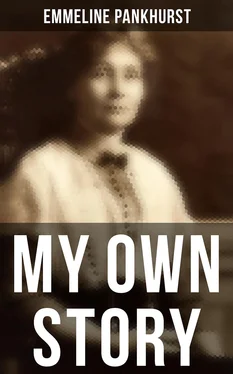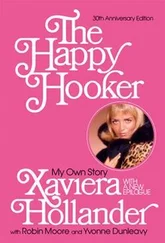All the suffrage organisations at once began making preparations for the great event. At the same time two hundred members of Parliament sent a petition to the Prime Minister, asking him to receive their committee that they might urge upon him the necessity of a Government measure for woman suffrage. Sir Henry fixed May 19th as the day on which he would receive a joint deputation from Parliament and from the women's suffrage organisations.
The W. S. P. U. determined to make the occasion as public as possible, and began preparations for a procession and a demonstration. When the day came we assembled at the foot of the beautiful monument to the warrior-queen, Boadicea, that guards the entrance to Westminster Bridge, and from there we marched to the Foreign Office. At the meeting eight women spoke in behalf of an immediate suffrage measure, and Mr. Keir Hardie presented the argument for the suffrage members of Parliament. I spoke for the W. S. P. U., and I tried to make the Prime Minister see that no business could be more pressing than ours. I told him that the group of women organised in our Union felt so strongly the necessity for women enfranchisement that they were prepared to sacrifice for it everything they possessed, their means of livelihood, their very lives, if necessary. I begged him to make such a sacrifice needless by doing us justice now.
What answer do you think Sir Henry Campbell-Bannerman made us? He assured us of his sympathy with our cause, his belief in its justice, and his confidence in our fitness to vote. And then he told us to have patience and wait; he could do nothing for us because some of his Cabinet were opposed to us. After a few more words the usual vote of thanks was moved, and the deputation was dismissed. I had not expected anything better, but it wrung my heart to see the bitter disappointment of the W. S. P. U. women who had waited in the street to hear from the leaders the result of the deputation. We held a great meeting of protest that afternoon, and determined to carry on our agitation with increased vigor.
Now that it had been made plain that the Government were resolved not to bring in a suffrage bill, there was nothing to do but to continue our policy of waking up the country, not only by public speeches and demonstrations, but by a constant heckling of Cabinet Ministers. Since the memorable occasion when Christabel Pankhurst and Annie Kenney were thrown out of Sir Edward Grey's meeting in Manchester, and afterward imprisoned for the crime of asking a courteous question, we had not lost an opportunity of addressing the same question to every Cabinet Minister we could manage to encounter. For this we have been unmercifully criticised, and in a large number of cases most brutally handled.
In almost every one of my American meetings I was asked the question, "What good do you expect to accomplish by interrupting meetings?" Is it possible that the time-honoured, almost sacred English privilege of interrupting is unknown in America? I cannot imagine a political meeting from which "the Voice" was entirely absent. In England it is invariably present. It is considered the inalienable right of the opposition to heckle the speaker and to hurl questions at him which are calculated to spoil his arguments. For instance, when Liberals attend a Conservative gathering they go prepared to shatter by witticisms and pointed questions all the best effects of the Conservative orators. The next day you will read in Liberal newspapers headlines like these: "The Voice in Fine Form," "Short Shrift for Tory Twaddle," "Awkward Answers from the Enemy's Platform." In the body of the article you will learn that "Lord X found that the Liberals at his meeting were more than a match for him," that "there was continued interruption during Sir So-and-so's speech," that "Lord M fared badly last night in his encounter with the Voice," or that "Captain Z had the greatest difficulty in making himself heard."
In accordance with this custom we heckle Cabinet Ministers. Mr. Winston Churchill, for example, is speaking. "One great question," he exclaims, "remains to be settled."
"And that is woman suffrage," shouts a voice from the gallery.
Mr. Churchill struggles on with his speech: "The men have been complaining of me——"
"The women have been complaining of you, too, Mr. Churchill," comes back promptly from the back of the hall.
"In the circumstances what can we do but——"
"Give votes to women."
Our object, of course, is to keep woman suffrage in the foreground of interest and to insist on every possible occasion that no other reform advocated is of such immediate importance.
From the first the women's interruptions have been resented with unreasoning anger. I remember hearing Mr. Lloyd-George saying once of a man who interrupted him:
"Let him remain. I like interruptions. They show that people holding different opinions to mine are present, giving me a chance to convert them." But when suffragists interrupt Mr. Lloyd-George he says something polite like this: "Pay no attention to those cats mewing."
Some of the ministers are more well bred in their expressions, but all are disdainful and resentful. All see with approval the brutal ejection of the women by the Liberal stewards.
At one meeting where Mr. Lloyd-George was speaking, we interrupted with a question, and he claimed the sympathy of the audience on the score that he was a friend to woman suffrage. "Then why don't you do something to give votes to women?" was the obvious retort. But Mr. Lloyd-George evaded this by the counter query: "Why don't they go for their enemies? Why don't they go for their greatest enemy?" Instantly, all over the hall, voices shouted, "Asquith! Asquith!" For even at that early day it was known that the then Chancellor of the Exchequer was a stern foe of women's independence.
In the summer of 1906, together with other members of the W. S. P. U., I went to Northampton, where Mr. Asquith was holding a large meeting in behalf of the Government's education bills. We organised a number of outdoor meetings, and of course prepared to attend Mr. Asquith's meeting. In conversation with the president of the local Women's Liberal Association, I mentioned the fact that we expected to be put out, and she indignantly declared that such a thing could not happen in Northampton, where the women had done so much for the Liberal party. I told her that I hoped she would be at the meeting.
I had not intended to go myself, my plans being to hold a meeting of my own outside the door. But our members, before Mr. Asquith began to speak, attempted to question him, and were thrown out with violence. So then, turning my meeting over to them, I slipped quietly into the hall and sat down in the front row of a division set apart for wives and women friends of the Liberal leaders. I sat there in silence, hearing men interrupt the speaker and get answers to their questions. At the close of the speech I stood up and, addressing the chairman, said: "I should like to ask Mr. Asquith a question about education." The chairman turned inquiringly to Mr. Asquith, who frowningly shook his head. But without waiting for the chairman to say a word, I continued: "Mr. Asquith has said that the parents of children have a right to be consulted in the matter of their children's education, especially upon such questions as the kind of religious instruction they should receive. Women are parents. Does not Mr. Asquith think that women should have the right to control their children's education, as men do, through the vote?" At this point the stewards seized me by the arms and shoulders and rushed me, or rather dragged me, for I soon lost my footing, to the door and threw me out of the building.
The effect on the president of the Northampton Women's Liberal Association was most salutary. She resigned her office and became a member of the W. S. P. U. Perhaps her action was influenced further by the press reports of the incident. Mr. Asquith was reported as saying, after my ejection, that it was difficult to enter into the minds of people who thought they could serve a cause which professed to appeal to the reason of the electors of the country by disturbing public meetings. Apparently he could enter into the minds of the men who disturbed public meetings.
Читать дальше












